News topics
Monthly Newsletters
// //// //// Online Booking //
// //// // // // // // //
For group bookings please contact
017687 77246 or
contact@derwentwater.org
August 2019
Special interests
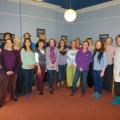
The hills may not have been alive with it, but the hostel certainly was for one weekend this month! A group of twenty from Lancaster-based group the Dot Crochets and the Raving Harmonies came to the hostel for a weekend of singing workshops.
The all-women group have been going for sixteen years and is open to any woman in the community who enjoys a good old sing along. Although inevitably people come and go from the group, Susan Keenan, who organised the trip says, 'the group still has original members, together with people who have come over the years and always welcomes new members. We have sung at weddings, civil partnerships, birthdays, funerals, community gigs, been involved with projects with local arts organisations and love the opportunity to sing at a range of occasions.'
The group like to get away together every now and then so that they can spend some solid time together singing. Saturday was spent in the hostel with two workshops, one with the group’s leader, Anni Tracey, and the other with Helen Chadwick, who is new to working with the group and who commented that the closeness of the group really benefited their singing and harmonies. Susan said: 'It’s a real luxury to be able to spend time in the day together learning new songs in different parts and harmonies and making a lovely sound! A weekend gives us chance to spend some valuable social time together too, with lovely food and a few glasses of wine!'
They were all in high spirits, making the most of a well-earned break away from the responsibilities of family life and doing something entirely for themselves. As well as enjoying learning new songs at their workshops on Saturday, they were able to spend Sunday morning doing some local exploring and having fun going on a walk together.
Sue told us that she’d chosen our hostel because they needed a big space for all of them to gather to do their singing, and most hostels have much smaller communal rooms. 'Derwentwater was the ideal setting for our weekend. We could use the dining room for our workshop, there is lots of room for socialising and relaxing and the location is just stunning. We went on a lovely walk on the Sunday and enjoyed glorious weather too, what more could we ask for!! The staff at Derwentwater Youth Hostel were brilliantly helpful and nothing was too much trouble.'
Many of them promised to return with their families and we would love to meet them. Meanwhile, we thoroughly enjoyed being entertained with live singing whilst we worked!
September 2013.
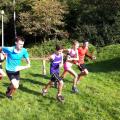
Liverpool Harriers certainly brought the good weather with them when they arrived with their junior athletes for the Club’s second visit to the hostel. This year they brought a lot of younger athletes with them – some as young as thirteen and fourteen. This gave the leaders, Adrian, Julie and Pete, quite a challenge in balancing a training schedule so that it would accommodate the different levels and strengths of the athletes.
However, Adrian and Julie are old hands and came up with an itinerary that could suit all the young athletes. On the first morning they all ran up Bleaberry Fell (590m), which is the fell directly behind the hostel and accessed from a path beginning at the scenic Ashness Bridge. But first of all they had to conquer the steep steps up by the side of our waterfall - which was a wake-up for quite a few of them! The younger ones were allowed to come back to the hostel for hot showers and a clean up, but the older ones pressed onwards and upwards towards High Seat, the next fell on the ridge.
Joe Ford, one of the older athletes in the club wrote:
'I have only very recently joined Liverpool Harriers, and I have been made to feel welcome by coaches, athletes and parents. Recently two training groups went on a weekend of running in Keswick,Lake District. Twenty five athletes and three coaches went on the weekend and I'm sure everybody enjoyed the hospitality of the staff at the youth hostel.
The hostel was very close to a long trail up the mountain and the route around the lake. Over the weekend we did three sessions. The first session was a run up Bleaberry Fell. Once we reached the top of the mountain we were supposed to run up to High Seat but because of a little difficulty on navigation we ended up trying out gorge running!'
After a packed lunch eaten in the sunshine at the hostel, they set off once again for another training run. You’d think after all this exercise they would be exhausted and sleepy, but everyone was in high spirits with lots of energy left to have fun in the evening.
The next morning was another warm and sunny day - perfect for another run on the fells after tucking into a very healthy breakfast. Joe says, 'We did a 13 mile run around the bottom of Catbells. With half an hour of the run to go we stopped off in Keswick and Lynn bought everybody a drink of their choice. We then set off again back towards the hostel'. This third run in two days - and for some of the older ones 40 miles in two days – seemed to finally tire some of them out and I think a lot of them slept well in the mini-bus back to Liverpool!
Joe said of the trip, 'The coaching on the weekend was second to none. All the coaches played their parts well and did well to keep up with the older lads. A big thanks to Adrian, Lynn and Pete for being such good coaches on the weekend.'
October 2013.
A few months ago, we had an enquiry from a triathlon club looking for a venue for a spring training camp for their members. The weekend was carefully chosen and the organisers came for a pre-visit to plan their training weekend of swimming in the lake, cycling around the passes and some road runs. We all remembered the amazing heatwave we’d enjoyed the same weekend in 2012. What a difference this year! Here’s the story of the Triathlete’s visit to Derwentwater on 22 March this year.
'As a club we decided it was time for a full weekend away to get in some 'fun' training. After looking at various hostels in the Lake District we decided on Derwentwater, with it's fabulous location for each discipline in triathlon. A morning's swim was planned 100 metres from the front doors, plenty of quiet hilly roads to ride along, finishing off with a trail run around the lake.
However the weather decided on plan B, the snow and ice postponed the swim and ride for later in the year. And instead a group of 14 of us ventured out on a 20 mile run instead! Followed by a well- deserved meal and (a few beers).The following day still had plenty of snow and, as we had already run around the lake, we decided on running up hills instead. The hostel has a perfect view of the 'Catbells' fell - and after looking at it all weekend, we decided to run up it! Temperatures reached -25 with wind chill at the top.
Even though the weather wasn't quite what we had planned this didn't deter our spirits and as a club we had a fantastic weekend. The hostel was well equipped and easily coped with the testing weather conditions. The staff were always ready to help and the cooked breakfast was enjoyed by all! It's already in the diary for next year... however we will also be booking sunshine for next time!'
It was great to have Knutsford Triathlon Club staying with us and see the value of a club get together. They’re a well-established, active club which is going from strength to strength. 10 members have successfully qualified to represent Great Britain at the European Duathlon Championships in Horst in the Netherlands. Good luck to all.
March 2013.
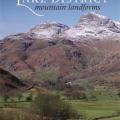
One of our frequent visitors, Peter Wilson, has made the Hostel and our guests a very good offer. Peter stays at the hostel while he undertakes fieldwork relating to the physical landscape of the Lake District. Peter, a Lancastrian, is a geomorphologist based at the University of Ulster in Coleraine and for several years has been documenting the landforms associated with glaciation and other processes that have shaped and continue to shape the landscape.
In 2010 his book Lake District Mountain Landforms was published and can now be purchased at the Hostel at a special discounted price of 15 pounds, with 5 pounds of the purchase price going towards Hostel funds. The 224-page book is in hardback and full colour. The book is not an academic text nor is it a guide book. Rather it provides enthusiastic Lake District visitors, particularly those who go fell walking, with explanations of how and when the landscape was created. It will also be of value to teachers and students of geography who visit the Lake District for field study courses. It’s a wonderful book which we think will be of interest to many of our guests. Here is a selection of reviews:
‘a remarkably lucid book’ (Books Cumbria website).
‘a comprehensive and highly attractive coverage’ (Conserving Lakeland magazine).
‘an excellent guide to the landforms of the Lake District’ (Earth Heritage magazine).
‘a beautiful, well-crafted book’ (Geography magazine).
‘will become a treasured piece of Lakeland literature’ (Online Fellwalking Club).
Please ask to see a copy at Reception.
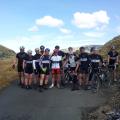
This was the question posed by Kel Hirst of City of Lancaster Triathletes (COLT) when they returned to the hostel for a training weekend after enjoying last year’s so much. Some of you may remember reading about their hardy exploits in this newsletter last year.
They are still as hardcore as they were then – possibly more so… They call a 45 mile round trip on their bikes over Whinlatter Pass to Cockermouth 'a short ride'… Well, I suppose in comparison to their epic 90 mile ride taking in Honister, Newlands, Hard Knott, Wrynose passes, it is!
Each day began with a brave dip in the lake before breakfast and then either a bike ride or a run. Some went for a run all the way round the lake on the path, a distance of nearly 9 miles, others went for shorter, 3 mile runs before or after their bike rides. And some of them tired out their legs with a fell run after cycling 3 or 4 times around the lake….
Kel said: 'We loved our weekend with you - the hostel is an unbeatable location for swimming, cycling and running. Derwent Water is just across the road and the Lakeland passes of Honister, Newlands and Whinlatter are all within a few miles. Comfortable accommodation, fantastic breakfast to set you up for the day and where else would you get a waterfall and a red squirrel with your bacon and eggs? Amazing views that you would expect to pay 100 pounds per night in a hotel.'
The club were always incredibly cheerful and happy whenever we saw them – they never seemed to look exhausted or downbeat, which given the amount of gruelling exercise they had done, they could be forgiven for! And in case you think everyone in the club are bright young things in their twenties, then you are mistaken. They have a wide range of ages in the club, including some rather inspirational over 60s.
They enjoyed themselves so much that they are planning to come again this year in September if possible. Maybe next time some of us might be brave enough to join them on one of their rides or runs!
April 2013.
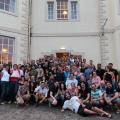
As time goes on our visiting groups seem to get more and more diverse and the gathering of 89 members of Mensa from around the world for a Summer camp proved no exception.
This is the seventh year that young members of Mensa have got together for an international Summer camp since the first one was held by Danish Mensa to celebrate their 25th anniversary. This year, Jacqueline Yu, who is originally from Hong Kong but now lives in London, decided she wanted to give something back and took the lead role in organising this year’s camp with the help of a small committee. The purpose of the camps is to bring together like-minded people where they can be themselves, meet other people and have a relaxing and unstressful time. Jacqueline told us, 'It is a big group of diverse people with a shared identity. The ten days allows people to really get know each other. They make lifelong friends and although they may not meet up very often they fit right back in with each other when they do see each other. We all share a kinship.'
They decided they wanted somewhere reasonably remote as they want a place where they can have an uninterrupted social gathering. Jacqueline knew from past camps that lakes are a popular feature - so she chose our hostel not only because of the accommodation but because of its proximity to the beautiful Derwent Water. They were blessed with some of the hottest weather we have had in several years, so swimming in the lake was very much on the agenda! Some of them signed up for activities such as archery at Rookin House and the climbing wall near Castlerigg, and several of them went on a day trip to Edinburgh. For most though, it was a chance to chill, chat, and get to know people or play games around the table. Mensa is in fact the Latin for table, and was chosen to symbolise people being gathered around a table as equals, irrespective of social distinctions such as race or religion.
Jacqueline said of their stay, 'We loved it the moment we got here - all the staff are very friendly and helpful and made us feel very welcome. The different function rooms have given us all the space we need and the self-catering kitchen is great. We have loved being close to nature. And everyone has said that the food is the best they have ever eaten at camp!'
July 2013.
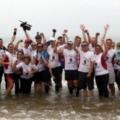
Last year I told you about the incredible efforts of a group of people who raised money for the Children’s Heart Unit Fund (CHUF) at the Freeman Hospital in Newcastle. Well, they were back again this year, doing their fourth amazing Coast to Coast challenge.
The challenge came about after Ivan and Nadine’s son Seb was given heart surgery and subsequent care at the Unit when he was a baby. They felt they wanted to give something back to the hospital and so Ivan conceived his ultra Coast to Coast (C2C) involving marathons, mega-cycle rides and long swims - a coast to coast triathlon in effect.
This year, the four day challenge included a 75 cycle ride from Whitehaven over four of the hardest mountain passes in the Lakes (climbing the equivalent of half of Everest); a swim across the lake from Nichol End to Barrow Bay; a 65 cycle over Hartside Pass to Alston; a 35 mile run through Northumberland; and, on the final day, a Marathon run taking them to the finish at Longsands Beach, Tynemouth. It was on day two and the swim across the Lake where the hostel played their part with hot showers, hot drinks and some well-deserved bacon butties. They had the most perfect day for the swim with sunshine, clear blue skies and a very still and calm lake.
It was lovely to see Ivan, Nadine and all their supporters again and we were delighted to meet Seb who is now a very active nearly-five year old! Ivan updated us on the progress of their fundraising efforts:
'Our C2C4 went fantastically well and was by far my favourite of all the challenges we have organised in the past 3-4 years. It was the perfect balance of toughness, humour and passion to ensure everyone had a fantastic time. It was the toughest C2C we have completed and pushed us all to the absolute limits. We are now close to 10,000 pounds away from our 330,000 pound target required to fund the complete rebuild of the playroom and outside play area of Ward 23 at the Freeman Hospital.
We wish them every success in reaching the total with this most recent challenge and look forward to seeing them next year for C2C5!
July 2013.
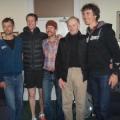
On the weekend of 11th – 13th April, all round Derwentwater Independent Hostel people were literally running, skipping, and jumping with excitement!
We were already excited that Thornthwaite-based company High Terrain Events were holding a trail running weekend at the hostel, a first for us, but we never expected to host quite so many mountain-running legends in one room, or to become the base for a successful Bob Graham Round attempt.
Barrow House has a long and close association with long-distance mountain running, with Bob Graham, the man who completed a pioneering circuit of 42 Lakeland peaks in under 24 hours in 1932, running a hotel here from 1943 to 1961. This feat, which starts and finishes at Moot Hall in Keswick, became known as the Bob Graham Round, and there is a memorial cairn commemorating Bob Graham at the top of our grounds, just by the side of the road to Ashness Bridge.
The Barrow House-Bob Graham connection is inspiring enough, but High Terrain provided living inspiration for their 15 participants in the form of Maryport-based 2013 World Trail Running Champion Ricky Lightfoot, as well as an unexpected visit from American ultra-distance running legends Rickey Gates and Scott Jurek. On top of this, GB mountain runner Martin Cox and local Bob Graham Round record holder Billy Bland (fastest round at 13 hours 53 minutes way back in 1982) joined the group for an amazing question and answer session on Saturday evening. The participants were over the moon, with one of them exclaiming, 'it’s like going to play football in the park with your mates and then Pele coming along to join in'.
Over the weekend Ricky Lightfoot led some of the training sessions for the participants, providing specific advice on downhill running and difficult terrain, but he also made some swift arrangements with his American friends, turning the weekend into a really gripping Bob Graham Round experience.
With a good forecast for Sunday 13th April, the best wishes of Billy Bland, and the promise of support from Ricky and High Terrain, Scott Jurek and Rickey Gates decided to make a Bob Graham Round attempt, starting their epic run at 3.10 am from Moot Hall.
So there was inspiration all round, with Scott Jurek tweeting: 'got a little inspiration and motivation yesterday for the UK classic Bob Graham Round. Ran the Coledale Horseshoe Fell Race (8.5 miles, 3,000' ascent), then had an evening talk at Derwentwater Independent Hostel (Bob Graham's old home) with BGR record holder Bill Bland. His record has stood for over 31 years, at 13:53!'
However, the pair did not find it easy, demonstrating the enormous challenge of the round. Scott reported: 'We cut it real close in the end, with only 16 minutes to spare, but we did it! Quite possibly one of the most difficult courses I have done in my life, but so beautiful'.Congratulations to everyone involved!
We are really looking forward to seeing High Terrain Events at Barrow House again, this time for another trail running weekend on 23rd-25th May and the 3 x 3000 80 km Ultra-Trail Race on 4th October. So far it has been high praise indeed for High Terrain.
April 2014.
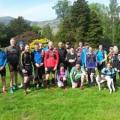
On 23rd - 25th May we welcomed back High Terrain Events for their second trail running weekend of the year. They bounded around with endless energy, and I am sure their shoes were even more brightly coloured than last time! One of the participants, Paul Robertson, even found time to write a long blog about the weekend. Here are some extracts from his account (you can read the full blog here: http://192-miles.blogspot.co.
‘Wow, what a good weekend that was: 62km of trail running in total and I'm still smiling! On Saturday, after a hearty breakfast (the hostel did a good job here), and a brief talk about kit and what to carry with you, we were ready to go. We set off skirting the lake and then came our first climb of about 300m ascent, up to the col between Cat Bells and Maiden Moor. Half way up we were treated to a demonstration of the best way to run uphill. Lee, one of the team, ably demonstrated this like a young gazelle. He made it look incredibly easy, so we all tried to follow as ably, but failing to look so good. Then my favourite, the descent to Dale Head Tarn. We managed to avoid or miss the track and ended up running through a bog! It was then a nice steady jog along the Borrowdale Valley, back to the lake and the hostel. Some of us partook in 10 minutes of cold water therapy, standing in the cold lake water up to our waist to prevent the lactic acid build up. So, that was our 20km before lunch.
After lunch, High Terrain filled the afternoon with talks and discussions, which included nutrition and hydration strategies by Phil Smith. Phil also talked about injury treatment, prevention and management, where he debunked a lot of the theories and published research.
After dinner we went for a run up Walla Crag, behind the hostel. It was a marvellous run, with some great views of Keswick and the lake. There were some deer up there too. A night run in the hills adds another dimension to running: great fun.
Sunday started with a routine of core stability exercises: lots of fun with an elastic band, walking sideways with the band beneath the feet, holding up the ends to get nearly all the muscle groups working. It was quite a hard workout before a 30km run!
Then top ultra-runner Ricky Lightfoot arrived and led us on the long run. I took my turn to run alongside "The Man", asking questions about nutrition, shoes, and technique: the usual stuff runners talk about and which he has probably been asked hundreds of times before, but he was humble and patient and seemed to be enjoying the run and the banter.
The organisation by High Terrain was top notch and the camaraderie and spirit of the runners was superb, not forgetting the hostel staff who did a great job. Thanks to all involved in making this a cracking weekend.’
Thanks for this blog Paul: the endurance gene makes for some great ultra-blogging as well as all the running!
May 2014.
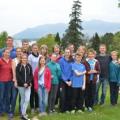
Now in their tenth year, One Life Racing Club is one of the largest triathlon clubs in the North East, based in Hexham, Northumberland. The club helps people of all ages and abilities to do their best and have fun in the world of swim-bike-run, and they train several times a week. However, earlier this year 33 members, ranging in age from 5 to 65 years old, came to the hostel to train several times in a weekend! Mike Pinkney, one of the club members and a qualified triathlon coach, told us all about their Derwentwater programme:
‘We arrived on Saturday lunchtime and went straight out on a bike ride: the more experienced cyclists went over the Honister and Newlands passes, while the kids whizzed around the lake. We followed that with a 10 km fell run for adults and a lakeside run for the kids.
On Sunday morning we had a swim in Derwent Water, followed by another fell run, and then after lunch we had a long bike ride. On Monday we had a swim in Derwent Water, followed by a run or a bike ride (or both!), and that was our amazing weekend of swimming, biking, and running: quite full on!
The table tennis room was a big hit with the kids, there was lots of space in the grounds to run around, the food was fantastic, and by popular demand we booked it up for next year before the end of the trip! That says a lot about how much everyone enjoyed it.’
Thank you Mike - we look forward to seeing even more of the One Life Racing Club members next year.
July 2014.
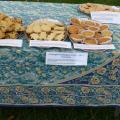
As many of you know, we love baking cakes at Barrow House. Cherry and Almond, Coffee and Walnut, Carrot and Sultana, Chocolate and more chocolate, Ginger, Luscious Lemon, and anything with a good drop of rose water and a splash of brandy. These are a few of our favourite cakes. But what are your favourite cakes? Do you have any special requests? Please get in touch if you have a recipe to share: we would love to hear from you (and to have an excuse for trying more cakes!).
In the meantime, here is one of the Georgian recipes that we found on the Cumbrian Historic Food website, providing a flavour of life at Barrow House in the late eighteenth and early nineteenth century. We will be making these Rout Cakes for our stall at the Derwentwater Regatta, held in Crow Park on 9th and 10th August: come and try them and tell us what you think!
Rout Cakes
A rout originally means a large and unruly gathering, but in the Georgian period it became a name for a fashionable assembly or large evening party. Rout cakes were made for such occasions. They resemble our modern-day rock cakes.
Pre-heat the oven to 350 degrees F/ 180 degrees C/ Gas mark 4
Cooking time: 16-18 minutes
450g flour
225g butter
225g sugar
225g currants
Rub the butter and flour between your fingertips until the mixture resembles breadcrumbs. Stir in the sugar and currants. Then wet the mixture into a stiff paste with:
2 beaten eggs
1 tbsp. orange-flower water
Enough sweet wine and brandy to achieve a stiff paste consistency (approx. 2 tbsp.)
Drop plum-sized balls of the mixture onto a greased baking tray and bake for about 16 minutes or until golden brown and easily moved off the tray. Transfer to a cooling rack.
July 2014.
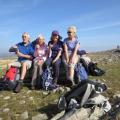
For those of you who might not be familiar with The University of the Third Age, this report from the Stafford Group will be a good introduction to the creative, educational, and leisure activities which they enjoy.
The Third Age sounds great - beyond the age of childhood, parenting responsibilities, or full time employment - and the Stafford Group has about 40 members, all retired and ranging in age from 60 to over 80 years old. Here is a report from the group:
‘Stafford U3A Hostelling Group enjoyed a fantastic five day break in the Lake District this month, staying at the wonderfully located Derwentwater Independent Hostel near Keswick.
25 of our group came on this trip, most arriving in time for lunch on Monday 8th September. Some had come by car, others by public transport (the age of the free bus pass), and we were able to sit in the sunshine on the hostel terrace, enjoying fantastic views of the lake. There was time for a short walk in the afternoon before we all gathered for dinner at the hostel.
Being such a large group and age range, we have a diverse range of interests and capabilities. Some of us like long walks (over 10 miles), while others prefer shorter more leisurely strolls, but everyone enjoys some sightseeing and cultural activities; fortunately the location of Derwentwater Hostel means that there is something for everyone.
The 'long' walkers tackled Causey Pike, Great Gable, and a particularly pretty walk from right outside the hostel. Climbing up to Surprise View we were rewarded with amazing views, before returning by the lakeshore path. Others combined a trip on the lake with a walk and afternoon tea. The jetty near the hostel is perfectly located for catching the Keswick Launch and spending all day on a picturesque sightseeing cruise around Derwent Water, hopping on and off throughout the day.
On Tuesday evening we enjoyed a pre-theatre supper at the Theatre by the Lake, followed by ‘The Winterling’. Although we all agreed that the cast gave excellent performances, we found it quite a puzzle and everyone had a different interpretation of what it was all about.
On our last night we held a quiz, devised by one of our members. We had random teams of four or five, and it was great fun: there is no prize for the winning team, just bragging rights until the next week away!'
Thank you to Stafford U3A for this report and great photos.For those of you who might not be familiar with The University of the Third Age, this report from the Stafford Group will be a good introduction to the creative, educational, and leisure activities which they enjoy.
September 2014.
Sue Keenan from the Dot Crotchets and Raging Harmonies has written this great report for us. We will let her speak/sing for herself!
‘Having thoroughly enjoyed our first visit to Derwentwater Independent Hostel in 2013, Dot Crotchets and the Raging Harmonies, a women’s community singing group based in Lancaster, returned in October for another song-filled weekend. This year there were nearly twice as many of us, as word had spread about what a great venue the hostel is and what a great time together we have. Dots who had also left Lancaster joined the group for the weekend, with people travelling from Scarborough, Liverpool and Manchester.
People arrived at different times on Friday: those who could get away earlier enjoyed walks, cafu00e9s and settling in and all 30 were in by 7pm for the evening meal, wine and lots of catching up.
We stayed in the dining room until late in the evening, singing a selection of songs in three and four part harmony arrangements, including some Georgian healing songs, an Acapella version of Walking on Sunshine, and some African rounds.
The main event for us was a workshop on Saturday, held in the dining room, where Ali Burns came to teach us a variety of songs. Ali is a renowned and extremely talented song writer who runs many workshops throughout the year and you can find examples of her work here: http://aliburns.co.uk. Ali taught us some beautiful songs and rounds in four part harmony arrangements: all were gorgeous arrangements, sounded amazing, and stirred many emotions for the group. It’s a real luxury for us to have the chance to be away from busy home lives and spend a day learning a range of new material that we can return to during the Dots’ regular Tuesday evening meetings.
After an amazing day, the idea of an impromptu evening cabaret spread and various members of the group displayed a range of talents in the show, including songs, poetry and the ability to eat an After Eight without using your hands, all brilliantly compered by Lynne in a purple dressing gown.
Sunday morning saw some glorious weather and the Dots went on a beautiful walk, stopping for a song in the hills and just making it back in time for lunch and farewells.
We are already talking about ‘next year’ so the Dots will no doubt be filling the hostel with song as an annual event.’
We hope so! Thank you to Sue and all the Dots.
October 2014.
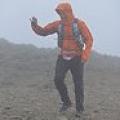
‘The Ultra Trail had been ‘tested by the world’s best’ (principally World Trail Running Champion Ricky Lightfoot) but now, importantly, also by Tim and Nick, two less proficient runners from Somerset and Crewkerne Running Club!
The route of the race went from Keswick to Scafell Pike, Helvellyn and Skiddaw, before dropping back to Keswick again, 50 miles later. Those mountains are all over 3000 ft, hence the 3x3000 title.
After a 7 hour drive (an endurance event in itself!) Tim and I arrived at the hostel, and it was clearly the place to stay for the race, with lots of other runners, and the guru of all things ultra-running Ian Corless, who would be reporting on the event. Everyone mixed in the dining room before getting early nights, ready for the 5am start!
Tim and I planned to run together and at 5am we were off, in heavy rain and darkness. Of the 250 who registered on the Friday only 190 turned up to the start, presumably due to the bad weather. For the first 4 miles we ran pretty constantly in about a foot of water, where the river had flowed over the path. We both started in full waterproofs. Nevertheless, I felt good at the start and there was good banter as we waded to the first water stop at 10 miles.
Somehow, somewhere, possibly even at the start, I lost both my water bottles from the holsters in my backpack. Lesson: invest in some decent tight-fitting bottles. Tim kept me going and I quickly worked out a Plan B, which felt feasible and involved making use of the water station cups and the over flowing streams around us, albeit slightly peaty and brown! On the plus side I had less weight to carry.
The first 24 miles were technical, in that the route was littered with rocks and constant twists and turns. The rain clouds departed as it got light, leaving some gorgeous views as we headed up towards Scafell Pike. The valleys overflowing with water looked spectacular, but you did have to watch your every step. Numerous people took tumbles, but fortunately all brushed themselves down and carried on. However, I started to find it harder and harder to keep pace with the rest of the runners around us.
Due to clag (thick fog), combined with the rain and darkness early on we weren’t allowed up to Scafell Pike summit: disappointing, but I have no issue with the race organiser’s decision. They still took us pretty high and then we had a really long, draining, twisty, turny, rocky descent to take us to the second checkpoint at 24 miles, at the base of Helvellyn. I slipped twice on the descent, landing a bit heavy on my backside, and I started to think about dropping out.
Guidance from many in the ultra-running world is to leave decisions about dropping out until after a proper feed at the upcoming checkpoint. You must do the check point, feed, drink, get warm and dry, recovering as much as possible, and then walk 100 yards onwards! Then you can drop out if you still want to. So at the second check point I reluctantly decided to follow the guidance! I resisted saying anything to the jolly marshals who were giving out amazing millionaire shortbread, flapjack, hot tea and more! I found my drop bag, with dry clothes, warm hat and gloves and base layers. I sat down, to one side, dried off and changed, including my shoes, and supped down a hot cup of tea with a handful of flapjack and shortbread.
Tim had left the checkpoint before I got there and I knew that he was running very impressively, not at all put off by the conditions, terrain and the very long ups and downs. For once I was very glad to see him disappear, knowing he had a great race ahead. Anyway…I sat there, contemplating, and I listened to the others around me, all thankfully more positive. Two things stayed with me…four Skipton lads, struggling too, were having a laugh about going home without completing any of the 3 x 3000 ascents! Good point I thought. How would I explain that to the kids? And what a waste of an opportunity it would be if I dropped out. Then an older runner (late 60s I guess) from the Lakes said all the right things to me. He told me that from Helvellyn the path would be much drier and less technical. We had done the hardest sections. The views would be spectacular too. So I got up and set off again.
Now amongst walk-runners, at the back of the race field and surprised that this slow speed was still within the cut off times, I started to feel better and really enjoy the views. I spent a lot of this section on my own, in a nice little dream land, looking down at smaller hills and distant lakes. It was an amazing route.
At about 6pm, as it was starting to get dark, I arrived at the Latrigg checkpoint, along with the 4 Skipton lads (who were clearly looking forward to getting to the pub) and 2 other friendly individuals. Geographically we were 3 miles from the finish in Keswick, but we still had a 10 mile loop up Skiddaw to do first. I had gauged from the others that if I went on to Skiddaw then I might be on my tod again for the next 4 hours, and so it was! I did briefly work on the other runners (the last 6 on the course) but it was a tough one to sell: 3 hours in a warm pub in Keswick or 3 hours of cold, dark plodding up Skiddaw?
So I set off on my tod, to encouraging words, and I could see the runners that were 3 to 4 hours ahead of me, coming off Skiddaw towards Keswick. And then I saw that one of these runners was my friend Tim, finishing 4 hours ahead. To think that I had originally planned to run with him!
Around the back of Skiddaw it was dark as dark, and a lone marshal spotted my headlight from way off, cheering loudly for me. When I reached her I found her tucked up in a bivvy bag, trying to keep warm, but she sent me up Skiddaw with a skip in my step: amazing the effect enthusiastic marshals can have on runners!
From the back of Skiddaw it was about a 1 mile ascent to the top, but it took me about an hour. Not much running going on there! I counted steps in hundreds to take my mind off the relentlessness. At the top, there was a strong cold wind and I found another freezing marshal, again in a bivvy bag for warmth, delighted to see the last runner through, which meant he could follow me down, picking up course markers on the way.
It was now just 6 more miles, all downhill, on nice tracks, steep at times, to the finish. I picked up a few curious glances as I ran through Keswick, but I was completely chuffed to finish, albeit at 11pm at night, 18 hours after I’d started.
A very good night’s sleep was had back at Derwentwater Hostel and a significant dent was put into the splendid cooked breakfast the next morning. The hospitality of the staff was, as per previous visits with my family, a joy: nothing was too much trouble.
Anyway, in conclusion… I was 160th out of 160, but happy to be amongst the finishers (sort of), in 18 hours, 3 minutes and 22 seconds. The winners were Donald Campbell in a ridiculous 8:28:56 and Lizzie Wraith, from Bath, in 10:42:23: these folk are a mystery to me! They received their prizes from Billy Bland, the local record holder for the Bob Graham Round.
It is really good, but no surprise, to see that the hostel is becoming a bit of a mecca for trail runners and ultra-marathon competitors. I see there are lots of guided trail running events and weekends based from the hostel, and I am sure its old proprietor, Bob Graham, would be delighted with this development. Many thanks to all the hostel staff for their wonderful welcome and hospitality.’What an ultra-achievement Nick!
October 2014.
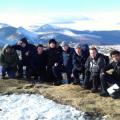
We were very impressed by the Nautical Studies group who came to us for the first time in February. One set of students battled blizzards and choppy water in their kayaking and canoeing sessions on Derwent Water, while the next set had to contend with large swathes of ice on the lake. The second set had some beautifully calm and sunny days though, and the instructors experienced the whole range of conditions! The group leader, Simon, has written this report for us:
‘The Fleetwood Nautical Campus at Blackpool and The Fylde College is one of the only places in the UK to offer Cadet Officer Courses, training people from all over the world to become officers in the Merchant Navy. Students complete an HNC or HND in Nautical Studies, learning all the necessary skills in navigation, offshore survival, firefighting and more to become an Engineering or Deck Officer on board a ship. Most of the students are sponsored by companies such as BP, RFA, Fishers, and Cunard.
At the beginning of their Fleetwood studies all of the new students engage in a residential week of challenging activities, designed to promote team-work and support their personal development towards adult careers as Merchant Navy officers.
We held two separate development residentials at the hostel, with instruction provided by Glaramara and Plattyplus. The program was a great success, with strong bonds forming between the students. This has encouraged them for the future, and established a great foundation for the three year course.’
February 2015.

Was it fitting that I should finish my Lake District Round at Derwentwater Independent Hostel, once owned by Bob Graham, creator of the Bob Graham Round? Had I, like him, completed 68 miles and the ascent of 42 Wainwrights in less than 24 hours? Well, no, I hadn’t. 39 Wainwrights and around 108 miles, but in 11 days…and that is how I like it!
I hope you’ll take the time to read my story, and perhaps think about planning a hostel to hostel walking route of your own. I’ve enjoyed 8 or so hostel to hostel walks over the last 20 years. I’ve really enjoyed the sense of a journey and getting away from the clutter of everyday life when travelling on foot each day, carrying with you only what you need. My sister used to have a fridge magnet which said ‘one moment on the lips, a lifetime on your hips’. I have developed a similar thought for backpackers: ‘one moment in the pack, 10 hours on your back’. So I try to keep my pack weight as low as I can, without compromising safety. I took good waterproofs, strong boots, hats for cold and sun, gloves, warm layers, first aid kit, map, compass, and whistle. But I slept in my spare T shirt, dried myself on a J cloth and a flannel, and took very light spare trousers and Crocs as indoor footwear. My luxury items were binoculars and camera. I posted parcels to a few hostels to top up with food, tea bags, toiletries, sun cream, and boot cream. You could start with a route of a few nights: for instance, Derwentwater Hostel makes a great base for setting out to the Honister, Buttermere or Borrowdale hostels. There are usually choices of routes between hostels, so you can adapt according to how you and the weather feel: it’s your trip, not something anyone else has devised or written a book about.
I set out from Ambleside Hostel, on June 9th, looking forward to the next 11 nights which I’d booked at a selection of Lake District Hostels. Depending on the weather each day, I planned to be flexible with the route, but hoped to be able to spend as much time as I could up on the hills. And there was always the bus…
Starting in warm dry weather, my route took me to Patterdale over Fairfield and St Sunday Crag, then to Grasmere via the Helvellyn Ridge, on to Elterwater via Pike O’Blisco (not an obvious choice, but to fit in with a friend on one day - the rest of the time I was on my own). From there over to Borrowdale via Glaramara - the hottest day, shorts and t-shirt weather so carrying the rest of my clothing and lots of water. Then the weather turned cooler for the rest of the trip, which meant a lighter pack as I wore more clothes and needed less water. I walked on over Dale Head, to Buttermere where I spent 2 nights, so enjoyed the next day with an even lighter pack on Whiteside and Grasmoor.
The next hostel was Black Sail. I set off past Scale Force, to Red Pike where I was stunned by at least 40 swifts zooming round the summit, flying so low and fast near me that I could hear the wind in their feathers. I watched them for several minutes. Then a great roaring below the summit, and a whirlwind swept nearby me across the summit, lifting and swirling small stones as it went past. Two most amazing things on one summit! Back then to the more ordinary delights of walking over High Stile and Haystacks to arrive at Black Sail. I had 2 nights here, and walked up Steeple and Pillar with cloud spilling over from the South in the morning, veiling and unveiling the views. The next morning it rained, for the first and only time on my trip. As it was a short walk to Honister, and not much option to lengthen the route in the wind and rain, I enjoyed a morning in pleasant company at the hostel, setting out for Windy Gap when the rain stopped. I went over Green Gable and Grey Knotts to reach Honister. Leaving there on my last whole day, I made a second visit to Dale Head. Near Dale Head Tarn I had a good view of 2 stoats. Going on to High Spy I usually walk along the western edge to enjoy the views down the steep crags, but it was far too windy. Derwentwater and the hostel, my last of the trip, came in to view. Passing over Cat Bells and around the South of the lake I was finally there! A bottom bunk in a quiet dorm! The best hostel meal of the trip - I always remember Derwentwater for its generous portions. I’d ordered chicken and chips and had been looking forward to them all day, and they did not disappoint.
Low cloud the next morning made a good excuse for a short walk into Keswick over Walla Crag to catch the bus. My legs, which up until now had felt strong, and only made brief protests when starting off up another hill, were not having a good morning - they were telling me they knew they hadn’t got to do much more so they weren’t going to try!! Finally, the crowded streets of Keswick. Grasmere and Bowness seemed very strange after the quietness of the fells and dales.
I’d thoroughly enjoyed my walk - I usually walk in the Lakes in March and October - but the fells in June were delightful. I’d enjoyed the company of the birds - skylarks, meadow pipits, wheatear, ring ouzels, buzzards, kestrels, ravens, crows, jackdaws, swifts, and swallows. The flowers had been beautiful, starting with bluebells and ending with foxgloves, and with heath bedstraw, tormentil, butterwort, lousewort, sundew, cotton grass, hawthorn blossom. The weather had been kind. I’d met some great people in the hostels and been well looked after by staff. Great memories.
My route in more detail:
Total mileage: 108 miles. Wainwrights climbed: 39.
Day 1: White Moss Common to Ambleside. Loughrigg. 5 miles.
Day 2: Ambleside to Patterdale. Low Pike, High Pike, Dove Crag, Hart Crag, Fairfield, St Sunday, Birks. 11 miles.
Day 3: Patterdale to Grasmere. Lanty’s Tarn, Keppel Cove, Raise, White Side, Helvellyn, Nethermost Pike, Dollywagon Pike, Grisedale Tarn, Tongue Gill. 14 miles.
Day 4: Grasmere to Elterwater. Red Bank, Elterwater, Langdale, New and Old Dungeon Ghyll, Pike O’Blisco, ODG. 10 miles.
Day 5: Elterwater to Borrowdale. From NDG, Mickleden, Rosset Gill, Allen Crags, Glaramara. 9 miles.
Day 6: Borrowdale to Buttermere. Rigghead Quarries, Dalehead, Hindscarth, Robinson, High Snockrigg. 8 miles.
Day 7: At Buttermere. Lanthwaite Green, Whiteside, Hopegill Head, Grasmoor, Wandope, Whiteless Pike.
Day 8: Buttermere to Black Sail. Scale Force, Red Pike, High Stile, High Crag, Haystacks, Loft Beck. 10 miles.
Day 9: At Black Sail. Steeple, Scoat Fell, Pillar, Boat How, Beck Head. 10 miles.
Day 10: Black Sail to Honister. Beck Head, Windy Gap, Green Gable, Brandreth, Grey Knotts, Moses Trod. 6 miles.
Day 11: Honister to Derwentwater. Dalehead, High Spy, Maiden Moor, Cat Bells. 9 miles.
Day 12: Derwentwater to Keswick. Walla Crag. 3 miles.
June 2015.
We are familiar with the sights and sounds of our local mountain rescue team Keswick MRT, but on the first weekend of September we were joined by the Arrochar MRT from Scotland, with 11 team members testing their skills across mixed terrain. The Arrochar team covers the Sy Lightfoot) but now, imand, including the Loch Lomond and Trossachs National Park, and they have about 30 members (all volunteers) in total.
The team did lots of climbing and walking during their stay with us, and this is just one of the great photos that they took. If you want to read more about the Arrochar MRT then you can go to their website: http://www.arrocharmrt.org.uk/
September 2015.
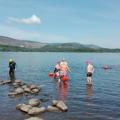
On a sunny weekend in May, about 40 keen swimmers came to stay at the hostel. They made ingenious use of the metal fencing around the storm-repair works, hanging up their wetsuits, costumes, and towels. It made a good sight!
The organising force behind the weekend was Kate Upshall Davis, who is training for an English Channel Relay Swim. Together with 5 of her friends, Kate will swim in one hour shifts across the channel at the end of July, celebrating her 40th birthday along the way. In the spirit of channel swims, none of the swimmers will wear wetsuits.
So during the weekend at Derwentwater, Kate and her friends swam in several different lakes, at almost every time of day. The photo above shows the wonderful weather they enjoyed.
Good luck to Kate and the rest of her channel relay team, and happy 40th birthday! Here is a link to her channel relay fundraising page: https://www.justgiving.
June 2016.

We often see Mountain Rescue vehicles going past the hostel for exercises and call outs, but this time we were the venue for the Lake District Mountain Rescue Search Dog Association Seminar, and it was great to meet different rescue team members and their dogs. One of the members had actually been here the week before, leading a school group from Penrith, so it was funny to see him with a different hat on, looking after his dog instead of 50 children. Here is the organiser of the weekend, Andy Peacock, with a report and two fantastic photos:
'Derwentwater proved the perfection location. Kathy and Dave and all the staff looked after us superbly. We were fed well and the accommodation was great for delegates staying over the weekend.
The Dining Room was a great place to hold the main lectures. Talks and presentations were given on topics as diverse as Scent Theory, Mental Wellbeing for Mountain Rescuers, and the Development of Search Dogs Abroad. The hostel also had several smaller rooms at our disposal that were great to use as break out rooms.
The grounds of the Hostel allowed us to work and demonstrate techniques with our Search Dogs in beautiful surroundings. Thanks Derwentwater Independent Hostel.'
You can find more information about the LDMRSDA here: http://www.lakes-searchdogs.org/
June 2016.
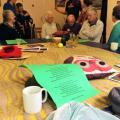
On Thursday 4th August a Tudor courtier walked through the door with a picture of Neil Armstrong, humming a Beatles tune and admiring the Georgian features in our dining room. It was as though 500 years of history had been concertinaed into one room! This was the scene for a History-themed Setting the Scene, one of a series of creative sessions provided by Theatre by the Lake, run with support from Amy’s Care for people living with dementia and their carers. One of the activity assistants, Rachel Agnew, wrote a report of the visit:
‘This week (4th August) Setting the Scene went on the road, with a visit to Barrow House. This eighteenth century mansion made the perfect backdrop for our History themed session. Katy, our lovely host, gave everyone some delicious chocolate cake. She told us about the unique history of the building and how it had been created for a young bachelor, Joseph Pocklington. Wealthy and eccentric Joseph had even steepened the flowing waterfall that we could see from the window.
Beginning the activities, we passed around photographs of famous people and events from history; from this we discovered that a few members of the group remembered the day of the Queen’s coronation. As always with Setting the Scene, music by Elvis and The Beatles led to much laughter and dancing, there were some wonderful impressions of the King of rock & roll. Afterwards, we played a spin game on the subject of Henry VIII and his wives. By taking part in the game we learned interesting facts about each historical figure and the Tudor court. Eileen shared a rhyme from her school days about this infamous King. Reassuringly, unlike Queen Catherine, our group agreed that they would rather have a drink the night before their execution than practise placing their heads on the block. After a sing-song, the group dabbled in a bit of Morris dancing; this went very well - we were swept away by the moves and enthusiasm of the participants – it was a wonderful end to this week’s session.’
It was a pleasure to host Setting the Scene and I really enjoyed joining in with the joyful singing and Morris dancing at the end of the session: what a lovely way to finish a morning at work. If you want to want to find out more about Amy’s Care, you can see their website here:http://www.amys-care.co.uk/
August 2016.

At the end of July, a new sight appeared in our grounds: some speedy-looking rowing boats. These boats were all the way from Boston Rowing Club in Lincolnshire, where they normally go up and down the River Witham.
The Boston RC training weekend was hosted by the local Lakeland Rowing Club, who currently do not have enough space for storing and launching visiting boats, but we were very happy to accommodate the boats on our grass.
Boston Rowing Club, established in 1856, is a very large and successful club, and it was a great opportunity for the relatively new Lakeland Rowing Club to train with them and try out their boats. It was particularly exciting for the Lakeland Juniors to row in an eight for the first time, especially as this was the same type of boat, the Italian made Filippi, that competed in the Rio Olympics.
The Boston RC training camp was a great success, with many thanks going to Lakeland RC, and we have our fingers crossed that Lakeland RC will be successful in their appeal for a permanent launch and storage space on the lakeshore. It would be great to meet more rowing clubs in the future.
August 2016.
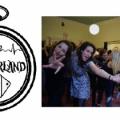
At the end of February 80 University of Edinburgh medical students spent an intensive weekend rehearsing their end of year musical at the hostel.
With the rain lashing down outside, the Musical Medics, with their full schedule of indoor activities, were the ideal group for a very wet weekend. Here is the producer, Abbey Wrathall, with a report of the weekend:
'Medics’ Musical is an annual performance by University of Edinburgh 5th Year Medical Students. It’s an original script, written by ourselves, with adaptations of well-known songs. We aim to be really inclusive, and there are over 100 people involved in this year’s show!
The Musical is such a tradition for medical students in Edinburgh, and part of it is a weekend of rehearsing and getting to know each other away from Edinburgh. This year Derwentwater Independent Hostel was a great option, a good distance from us and the chance to see more of the Lake District. Unfortunately it was a very soggy weekend, but we had a lot of fun anyway, including a great 3 course dinner and a quiz on Saturday evening. Thanks to everyone for helping to make it happen!'
We hope all goes well for finals - both the exams and the musical performances!
March 2017.
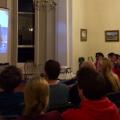
Extreme medicine, extreme cake baking, extreme amounts of coffee! The songs of the Edinburgh medics faded away to the sounds of mountain rescue sirens, and the dining room morphed from musical theatre to lecture theatre (thankfully no surgical theatres here yet!).
At the beginning of March we really enjoyed hosting another Expedition Medicine course, with about 70 medics working their way through an intensive schedule of lectures, team building activities, outdoor rescue scenarios, and endless flasks of coffee.
The course was very successful and we wish the participants all the best for future expeditions.
March 2017.
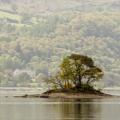
At the beginning of May, 13 members of the Reflex Camera Club, Bristol, came to stay for a week. There was dazzling sunshine every day, and lots of wildlife in the grounds, but the waterfall dwindled to a trickle, so no spectacular waterfall photos! Here is a report from the organiser, Maurice Thompson:
We couldn’t have chosen a better week to visit the Lakes, as the weather was superb. There is enough to keep a photographer busy just around the hostel itself, with the waterfall, jetty, Surprise View and Ashness Bridge within hundreds of metres, and we also benefited from the assistance of a member of the local Keswick Camera Club.
Some of us also travelled in different directions each day, meeting up in the evenings to discuss the day’s adventures and sometimes hearing of mishaps, like falling in the water. We found our stay at the hostel warm and welcoming, with good advice from the staff, and very good living arrangements and comfortable beds. We only had one evening meal on arrival (which was excellent and good value for money) as we were out around the Lakes late into the evening, but we did all have breakfast each morning as we needed to sustain energy for the day. Summing up a very successful trip that we hope to repeat in 2018 to catch the Autumn colours – can’t wait.
May 2017.
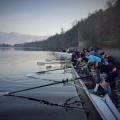
In April we enjoyed meeting three different rowing clubs, thanks to collaborations with Lakeland Rowing Club (based on Derwent Water). First came York City Rowing Club, with their diamond patterned leggings. Then came St Catherine's College, Oxford, followed by Liverpool University Boat Club.
Each group did so much training! The Liverpool lot even carried on rowing off the water, with several rowing machines on the terrace, borrowed from Lakeland Rowing Club. The rowing machines were in use from dawn to dusk, and there were pre-breakfast training sessions every day. Early to bed, early to rise, disciplined, on-time, and polite - perfect groups for the hostel! We hope their hard work pays off with a good season of regattas.
May 2017.
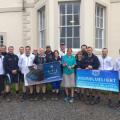
On Sunday 17th September we were delighted to welcome a group of Our Blue Light emergency service-people on their walking relay across the North of England. Here is a description from their website:
'Our Blue Light aims to bring #OurBlueLight services together as an emergency and essential services family, to improve mental health and reduce the stigma surrounding it, whilst also raising awareness of health and wellbeing and how we can improve thisu200b. We plan on organising events around the country to achieve our aspirations, whilst also working closely with all emergency service employers and their champions to ensure a productive and healthy future for all.
Last year we held the Blue Light Walk which brought together all emergency and essential services from around the country. This year the walk has developed into the UK Mental Health Relay, raising awareness of mental health within the emergency and essential services and also amongst the general public. We intend to engage different communities around the country to open up and talk about this important subject.'
We were one of the stopping points on the North West section of the relay, with a team of 18 walking from Carlisle to Blackpool in approximately 20 mile stages. It was a pleasure to feed and water the team, and we enjoyed following their progress on twitter and facebook. You can find out more about Our Blue Light here: http://ourbluelight.com/
September 2017.
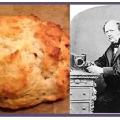
This year, as well as giving tours of the house for the Heritage Open Days, we decided to provide a brief history of the house through baking, from 1787 (Rout Cakes and Ratafies), when the hostel was built for the eccentric wealthy bachelor Joseph Pocklington, to the present day (Gluten free, vegan Chocolate Brownies), where independence, a fantastic catering senior, and a huge choice of ingredients allows us to bake anything we like. The Lemon Buns from the mid-nineteenth century, when the photography pioneer William Henry Fox Talbot rented Barrow House for several months, seemed very popular, so we have included the recipe here:
Lemon Buns
Rub 4oz butter into 12oz flour, and then add all of the dry ingredients: 2oz caster sugar, 2oz currants, 2oz lemon peel, rind of 1 lemon, pinch of nutmeg, 2tsp baking powder, u00bcoz caraway seeds, and a pinch of salt. Beat up 1 egg and u00bc pint of milk and juice of 1 lemon and mix with dry ingredients to a stiff paste. Divide mixture into 12 buns and brush over with milk and sugar. Bake in a quick oven (approx 200 C) on a greased baking tray for 8-10 minutes.
The recipe, and others from that period, can be found here: http://recipespastandpresent.
Please let us know if you would like the full 'Brief History of Barrow House through Baking' document and we can email it to you.
September 2017.




